The headlines from China that make their way into the sports sections of western media very often contain errors, falsehoods and sometimes just downright lies. Two rules of thumb: if it sounds too good to be true, it is; and be very, very careful with numbers. Here’s a selection of recent stories that have stretched the truth in various ways…
It pays to be skeptical in China — and that’s as true in sports as it is in economics. The so-called “Li Keqiang index,” a term originally coined by The Economist after it was revealed the Chinese premier prefers to gauge the economy using his own indicators instead of trusting official data, is well known. However, the figures bouncing around China’s sports sector are just as likely to raise eyebrows.
Just this week, a report from Sports Illustrated’s Grant Wahl — arguably the most connected man in US soccer — said that new LA Galaxy signing Zlatan Ibrahimovic, who dominated sports headlines last weekend after scoring a stunning goal in his MLS debut, had turned down nearly $100 million from a Chinese club to ply his trade in Los Angeles for the meager sum of $1.5 million per year.
But if it sounds too good to be true, that’s because it is.
The number comes from former Galaxy player — and now the club’s technical director — Jovan Kirovski, who most likely got his information from Ibrahimovic’s agent, Mino Raiola.
That’s Raiola, referred to by Napoli president Aurelio De Laurentiis as “a pain in the backside,” by legendary Manchester United manager Sir Alex Ferguson as “a shit bag,” by the current Manchester United administration as “meddling,” and summed up by The Independent as “one of the market’s most outrageous figures.”
As detailed in this Forbes piece (and see screenshot below), rumors about big-name players going to unnamed Chinese clubs regularly gain traction overseas because it has happened before. Carlos Tevez was likely only making about half of what was widely reported, but that would still equate to more than $400,000 per week for what he later described as a “seven-month vacation.”

But 99% of these rumors don’t pan out, because they are either started by bored tabloid editors looking to fill column inches or by agents floating the concept of mysterious Chinese interest with the intention of driving their players’ salaries even higher.
The financial landscape in the Chinese Super League has shifted radically since Tevez pocketed his millions, with sweeping changes brought in to curb what was viewed as overspending. And while Wahl told me this week that Kirovski was likely informed about the offer last year before that change truly took effect, there’s no CSL club in today’s environment either willing or able to offer anything close to that number.
Man Utd’s mythical millions
Ibrahimovic moved to the US last month from Manchester United, one of the most commercially profitable brands in the world. The fact that the club lists an “official paint partner” in Japan tells you everything you need to know about how well it maximizes its commercial potential around the world. But the club, like the agents, can also play fast and loose with the numbers.
Man Utd’s latest deal was signed this week with Chinese financial giant Ping An, giving Chinese customers the option of getting a club-branded UnionPay credit card. The question is, though, how many people will actually do that.
The official release says Ping An – who has been the title sponsor of the CSL since 2014 – will “engage with the club’s 100 million-plus Chinese followers,” with Richard Arnold, the club’s Group Managing Director, saying:
“With more Manchester United followers in China than anywhere else in the world, it is really important for us to be able to engage and communicate with our loyal Chinese fans, in what is a significant region for the club.”
The emphasis above is mine, because the club has once again deliberately confused the concept of follower and fan. A club-commissioned survey in 2011 found that Manchester United had 659 million followers around the world, of which 108 million were located in China. But the club’s own definition of a “follower” is anyone who takes an interest in the club’s fortunes — and that includes fans of rival clubs, who would rather gouge their own eyes out than use a Manchester United credit card. That’s how much a true “fan” — not a follower — cares about his or her own club.
Aussie Rules reaching for the sky
Next up in this special edition of “Sporting Skepticism” is the soccer-rugby hybrid known as Australian rules football. The league has been making inroads into the Chinese market in recent years with a number of commercial tie-ups, highlighted by the first regular season AFL game to be held outside Australia or New Zealand, which took place in Shanghai last May.
Gold Coast and Port Adelaide will again play in Shanghai this year with coverage on three local TV stations. But with the third sentence of the AFL news item citing a population of more than 130 million in those stations’ local markets implying a “potential for huge audiences,” Australians would be forgiven for thinking that China will quickly become the league’s biggest market.
In reality, a deal to air 23 games this year on Guangzhou TV is not to be sniffed at – though the channel should not be confused with the much larger Guangdong TV – but the fact remains that the sport will remain firmly in “niche” territory in China for years to come.
Predicting Kim Jong-un’s future: a fool’s errand
Another interesting claim in the past few days came from IOC President Thomas Bach, who said Kim Jong-un was committed to sending a North Korean delegation both to the Tokyo Olympics in 2020 as well as to the Beijing Olympics in 2022.
That’s all well and good for Bach, who likes to portray himself as someone who unites peoples through sport, but so much can happen in four weeks on the Korean peninsula that looking four years ahead seems rather pointless.
In summary, a lot of people – many of whom should know better – say a lot of things about China, taking advantage of the fact that so little is known about what actually goes on here. But use common sense, be skeptical, stick to the rules of thumb above and you’ll have a better chance of figuring out if something is true or not.
If in doubt, get in touch!
A modified version of this column originally appeared at SupChina here.



Really nice blog ! please keep up good work again.thanks
Hi! This is valuable football match movie.
Beijing Guoan against Guangdong Winnerway 1994
https://youtu.be/Nv6l1oEZ6GM